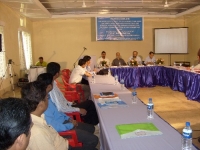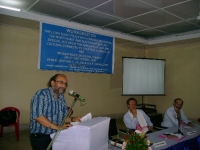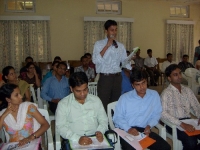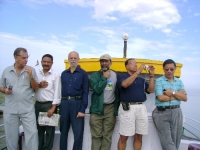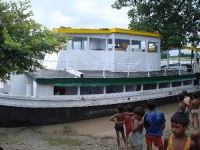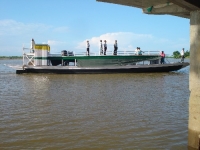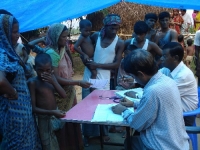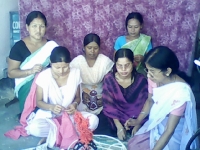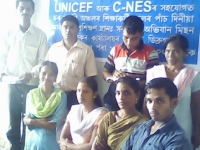By the Brahmaputra (Vol:3)
C-NES Newsletter
(For the quarter July -Sep 2008)
Editorial
The Gangtok brand
Travel anywhere in the North-east and we find long stretches of city roads littered with empty plastic food packets, cigarette stubs, “disposable” but very eco-unfriendly plates and glasses (from some binge) and food waste and other rubbish. This makes a very strong and negative impression on visitors from outside and it is most visible in cities like Guwahati where rubbish bins are overflowing and the streams are polluted beyond measure. The river banks are used for washing and defecation, leading to greater destruction of our environment as well as harm to the health of downstream communities.
This is in sharp contrast to impressions of Gangtok. A visit to Sikkim’s capital left me and a number of others from different parts of the country who had come for the first Academic Council meeting of the new Sikkim University amazed by its utter cleanliness. The State may not be the most rapidly developing part of the world but in terms of basic governance and people-friendly approaches, it appears to have few peers. I have traveled in Sikkim and even trekked there and found villages at 11,000 feet which have running water and electricity as well as mobile connectivity. There are cobbled footpaths connecting villages and homesteads. Even one or two of these services are hard to come by in large parts of urban and rural Assam, not even in Guwahati.
In Gangtok I looked hard for the ubiquitous plastic litter that flutters along the edges of roads and buildings everywhere in this country. Not one scrap on the roads, and the central MG Road is now a 24-hour bright and peppy pedestrian zone with music playing, restaurants, shops and hotels and a very friendly ambience. All the hotels are full as are the markets. I walked down to my hotel on a lonely hill slope well past 11 pm; the air was crisp and the solitude was comfortable, there was little traffic so one could walk quite easily on the roads.
There are blemishes, of course – during walks through the town, I noted that some of the streams had plastic garbage – not visible and quite unhealthy. The approach to Gangtok, a national highway that snakes across the lower Himalaya from the plains of West Bengal, is one of the shabbiest and worst roads it has been my misfortune to travel on – in terms of traffic, broken stretches, sinking stretches and dust. We can complain bitterly about the Guwahati-Shillong road; but it’s still far better.
Yet, the friendly atmosphere of Gangtok is engaging because the people are open and welcoming, not just the hoteliers and tour operators or shop keepers; it is an approach that the rest of the North-east could learn from, instead of taking attitudes of constant confrontation and bandhs and strikes that are enough to scare people off. What we need is the “Sikkim brand” of hospitality and approach to cleanliness, certainly in public places. And to emulate them in the use of paper carry bags.
Sanjoy Hazarika
Managing Trustee
Programme Highlights
1. Workshops at Dibrugarh
The Centre for North East Studies and Policy Research (C-NES) organized two back-to- back workshops at Dibrugarh: the first on “The Look East Policy (LEP) with perspectives from the North East and South East Asia and a special focus on the Green Economy and Cultural connectivity” on Sep 5 and the second on” Infrastructure Development, with a focus on new technologies and energy” on the following day, September 6, 2008.
A number of eminent persons drawn from various states of the North East Region and outside took part in these workshops including Shri Falguni Rajkumar, Secretary NEC, Shri Bhaskar Baruah, Chairman Assam Sixth Pay Commission and Former Union Agriculture Secretary, Shri Sanjoy Hazarika, noted writer and Managing Trustee C-NES, Shri Paranjoy Guha Thakurta, columnist, anchor and author, Shri Ranjan Chatterjee, Chief Secretary, Government of Meghalaya, Lt. Gen. JN Mukherjee (Rtd), Former Chief of Staff , Eastern Command Dr. Jayanta Gogoi of Dibrugarh University, Dr. Udayon Misra, Member ICSSR, Shri PD Rai, Head of the north east operations for Basix, the Hyderabad based micro-credit firm and Colonel M Mendonca from the Second Mountain Division, Dinjan.
Speakers at the workshops which were attended by over 100 persons including senior officials, academics, officials from the armed forces, tea, industry professionals, students and civil society members expressed concern about the pressures created by continued illegal migration as well as China’s strategic interests and spoke of the need to protect small and vulnerable communities from regional and international economic pressures. A consensus was reached that for the Centre’s much-talked about LEP to take off, rapid, time bound and visible progress in infrastructure in the region is crucial.
“These discussions should be seen as a public response to relevant parts of the NER Vision 2020 document released by the Prime Minister recently,” said Mr. Sanjoy Hazarika, C-NES Managing Trustee.
The following are some of the recommendations suggested at the workshops.
- GOI should organize a senior-level international sectoral meeting in the region, preferably at the ministerial-level with the India-ASEAN partner group.
- North-east should work with the newer, upcoming economies of South East Asia and provide healthcare and English language skills to the LDC (Least Developed countries) of Myanmar, Cambodia and Laos
- Export of natural resources from the NE to be slowed and eventually stopped and only value added goods exported.
- Setting up of language schools and capacity building in these areas
- Need to protect small and vulnerable communities, more so in the border areas from regional and international economic pressures, through legal and economic support
- Public Private Partnerships to be the principal driver for growth
- Participatory project planning and implementation approach
- Prioritization of the education sector could push economic growth
- A regional approach to flood management with the focus on Assam as the pivotal state through which all major roads and communications links passed
- Strong focus on eco-tourism and the power sector
-
A review mechanism for all projects in the region above Rs 5 crore for greater transparency
The workshop also witnessed a signing of an MOU between C-NES and Basix, the Hyderabad based micro- credit firm, to provide micro credit facilities to the chars and saporis frequented by the boat clinic. Basix was represented by the head of its north east branch, Mr. PD Rai, noted environmentalist from Sikkim and Deputy Chairman, Sikkim Planning Commission and C-NES by Mr. Sanjoy Hazarika.
In another positive development, the Rotary Club of Dibrugarh offered to provide free services to children with congenital heart diseases referred by the boat clinic health camps in Dibrugarh.
2. Increase in number of River Dolphins
In the earlier newsletter we had mentioned about how C-NES’s sustained campaign for the cause of the highly endangered river dolphins brought significant results with it being declared the State Aquatic Animal by the Assam Chief Minister, Shri Tarun Gogoi on the World Environment Day on June 5, 2008.
There has been a reflection of the success of the intervention in recent days: after years, dolphins have started appearing in large numbers near Dhubri, in Lower Assam, for the first time in July 2008 – indicating that they recognized that it was safe for them to live closer to shores. There has been an increase in number of river dolphins in Assam from 248 in 2005 to 268 in 2008 according to a survey conducted in the year 2008 by an environment group Aranyak.
3. Alternative Livelihoods
The Ford Foundation funded C-NES’ project on “Promoting Conservation: Saving the Gangetic dolphins, creating livelihoods, eco –tourism” as part of a bigger study on livelihoods continues to bring about gradual economic transformation in rural groups in three districts of Assam- Kamrup, Dhubri and Tinsukia. Small grants to SHG’s especially women have improved economic empowerment. The SHG’s are into weaving, goat rearing, pickle making and piggery. This is a new source of income. A total of 57 SHG groups have been formed so far.
In September 2008, eleven (Eri) spinning machines were distributed to the women SHG, “Radhika Shanti” from Kukurmara to improve Eri yarn and production enhancement.
4. Dairy Programme
Seventeen farmers from Darrang, Dhemaji and Dibrugarh were sent for 5 days training on Dairy Animal management (DAM) at NDDB Siliguri in September 2008. Local youth and dairy farmers are being periodically trained by C-NES in these three districts in basic veterinary treatments, Dairy Animal Management (DAM) and Clean Milk Production (CMP) at the National Dairy Development Board (NDDB) Siliguri, West Bengal.
5. Eco-Tourism
Kukurmara in Kamrup, about 40 km west of Guwahati developed as a tourist spot by C-NES, welcomes tourists to come and view dolphins on the Kulsi, a tributary of the Brahmaputra. Local entrepreneurs and SHG groups have set up here an interpretation centre, boats for taking tourists about as well as huts for brief breaks. Traditional handloom based on Eri, the “vegetarian” silk and other products are popular with the tourists, increasing local incomes.
Steve Sapienza, a TV producer from the United States visited Kukurmara in August 2008 accompanied by Bhaskar Saud, Project Officer C-NES and was able to view a sizable number of this elegant creature in spite of it being an off season for dolphin viewing.
6. ‘Ships of Hope’
Boat Clinics reach thousands in flood-hit areas
C-NES has been quietly providing health services to communities on the river islands of the Brahmaputra in Assam, reaching thousands who do not have access to health facilities and services through its unique Boat Clinic” initiatives.” even as monsoon floods continue to ravage villages across the state. The target is to reach at least one lakh persons by the year-end and to further increase this number substantially in 2009 as a result of the PPP (Public Private Partnership) between C-NES and National Rural Health Mission signed in February 2008.
The July and August 2008 camps, where a total of nearly 20,000 people were treated, were conducted under very difficult weather conditions with monsoons in peak form and the Brahmaputra in full spate.
The health teams, led by District Community Organizers (DCOs), work extensively on health awareness issues like reproductive health, sanitation, nutrition, malaria control and prevention. Priority is given to delivery of national immunization programmes for children as well as pre and post-natal check ups for women. There are doctors, nurses, pharmacists and laboratory technicians.
New vessels for three districts
The C-NES-NRHM partnership’s health campaign through the boat clinics in the Brahmaputra Valley got a burst of energy in the past months with three new boats being pressed into service in Tinsukia, Morigaon and Dhubri districts.
The SB Swaminathan and SB Rustam, which have been funded from donations by the prominent editor and economic specialist, Swaminathan S. Aiyar, and his wife, Shahnaz, have been built at Dibrugarh and Dhubri respectively. The first is for the district of Tinsukia, neighbouring Dibrugarh, while Rustam is serving Dhubri on Assam’s south western border with Bangladesh. The Aiyars have funded five boat clinics which are assets of C-NES.
SB Rustam has been operating in Dhubri since August 1st 2008; Swaminathan made its first official trip on 24 September, 2008. The Deputy Commissioner of Tinsukia, Joint Director Health and other health officials were invited for its first trip.
There are facilities for OPD, one laboratory, two cabins, one kitchen, and medicine chests, one 200 litre water tank, toilet facilities, a nurse’s room, one generator and audio visual aids. Laboratory equipments have been the latest addition. These boats have been designed to make life as comfortable for the staff as possible that have otherwise to work under extremely challenging conditions.
A hired boat for Morigaon district in Central Assam has also been completed built to the specifications developed by the Project Management team and was launched there on 22 September 2008. The Morigaon boat has been hired from a local entrepreneur, Md Ismail Hussain.
Doctor’s boat
The Dhemaji Boat Clinic, “SB Shahnaz” has a more popular name now- it is called the “Doctor’s Boat” by the children of the saporis. They run along with the boat from the river bank, waving their hands in great anticipation as the boat passes by their sapori. This is a good reflection of how much the health team has managed to penetrate into these remote areas and making their presence felt and appreciated by these people.
Healthier mothers
The haemoglobin tests mandatory for every pregnant woman in the camps along with tests for Malaria and sugar is a positive development. Significantly, the haemoglobin level of poor pregnant women who have been supplied Iron and Folic acid tablets by the health team in all the five districts covered by C-NES is increasing.
Memorable experience
On the return journey from a health camp on 20 August 2008, the Dhemaji health team was stopped at Lamba Apsara sapori by the desperate parents of a two year old child suffering from acute respiratory distress- the child was in an unconscious state. The doctors treated the child with adequate doses of deriphylline and sulbultamol and it was almost a miraculous recovery within ten minutes. The next week while on a routine visit to one of the nearby saporis, the health team enquired about the child and they were told that he had recovered fully.
The DCO Dhemaji, Mr. Dulu Buragohain, this was one of the” most memorable experiences” for the team.
7. Review Meetings and expert visits
During July 2008, Ms. Karen Hulshof, Representative, UNICEF India and Dr. Rownak Khan, Program Officer, Immunization and Child Survival Unit, UNICEF, New York and Ms. Sumaira S, Choudhury, Project Officer, Monitoring and Evaluation, UNICEF, India visited AKHA at Dibrugarh.
A one day workshop on Janani Suraksha Yojana (JSY) was held on 22nd July at Dibrugarh. It was organised in collaboration with District Health Society. There were 24 participants in the workshop including ASHA, AWW and CW from the islands.
Nirupam Bajpai, Senior Development Advisor and Director, South Asian Programmes, Centre for Globalization and Sustainable Development, The Earth Institute, Columbia University along with P.N. Bora, State Program Manager of NRHM, Dr. D.K. Hazarika, Joint Director of Health Services, Morigaon, Suravi Grover, a researcher of Columbia University and few other officials from the Health Society of Morigaon visited the camp site in August 2008. Mr. Bajpai interacted with the local people and appreciated the boat clinic team members for their hard work and commitment.
Steve Sapienza, a visiting TV journalist from USA along with Sanjay Sharma, Associate Program Manager of C-NES visited a Morigaon camp on August 2008. He met the locals and appreciated the boat clinic initiatives to provide health services for these marginalized people. He is making a film on health issues and water concerns in NER and Bangladesh; he also visited the C-NES office in Guwahati and interviewed Mr. Sanjoy Hazarika, Managing Trustee at length there.
8. Education
The education initiative of C-NES with UNICEF support in Dibrugarh saporis has been able to reach out to a sizable number of school dropouts helping them to rejoin the mainstream education.
The main activities that are being conducted are: starting two bridge course schools, four feeder schools, training of teachers, vocational training of girls and setting up of a school library in the existing schools. Feeder schools are developed in those areas where there were no schools and managed by local communities. Children are admitted in the government-run Lower Primary schools of the nearby saporis while they continue their classes in these feeder schools. The thrust of the project is on including children from all social groups, working with the community to generate ownership of schools and encouraging community engagements in activities relating to schools and education. The education officer of C-NES visits the schools and conducts tests from time to time to assess the progress of the students.
Vocational training
In August 2008 two vocational training courses were simultaneously started by C-NES in the Panitola and Lahowal block for which ten girls were selected. The duration of the course is three months where they will be given lessons in knitting, cutting, stitching, embroidery and craft making. As most of the older children of the saporis are illiterate, this kind of training will enable them to become self employed.
Teachers training
In September 2008 a five day teachers training for bridge courses and feeder school teachers were organized by C-NES in collaboration with Assam Sarba Shiksha Abhigyan (SSA). Eight teachers undertook the training for updated methods of teaching.
Working together
The educational and the health team work in team. Monthly health check ups are conducted by the medical team and supply of Vitamin-A supplements and de-worming is also exclusively done for them.
9. Media Fellowship
Ms. Papri Sri Raman, Special Correspondent for IANS, posted in Chennai, Tamil Nadu, has been awarded the Third Media Fellowship on Refugee Issues sponsored by the United Nations High Commission for Refugees and the Centre for North East Studies and Policy Research (C-NES) for her proposed study on ‘Sri Lankan Refugees: Away from home Across the Palk Straits’ in Chennai, Tamil Nadu.
“The Tamil refugee story had fallen off the map and this was an opportunity to review it afresh and in depth,” said Mr. Hazarika.
Ms. Raman is the third and final awardee of a UNHCR-C-NES fellowship this year. The first fellowship on Chin Refugees of Myanmar went to Mr. Nava Thakuria, a Guwahati-based reporter; the second on the need for a Refugee Specific Legislation in India was awarded to Ms. Ratna Talukdar, a freelance journalist from Assam. Ms. Talukdar’ articles have appeared in Frontline (August14-29, 2008 issue) India Together (14 September 2008) and Women’s Features Service (in October).
10 “Children of the River” at German Film Festival
“Children of the River: The Xihus of Assam” a 29 minute documentary film on the highly endangered river dolphins of the Brahmaputra was selected for the competitive section of the “Bollywood and Beyond” Indian Film festival held at Stuttgart, Germany from July16-20, 2008.
The film is produced and scripted by Sanjoy Hazarika and directed by Maulee Senapati. Senapati was officially invited by the film festival authorities to the Stuttgart Festival where he also participated in a panel discussion session. The film’s screening was held on 19th July to a receptive audience.
This was the only film from India’s North-east which was screened at the competitive section of the festival.
11. Sanjoy Hazarika nominated to Centre- State Panel
C-NES Managing Trustee, Sanjoy Hazarika, was nominated to Task Force-5 on Criminal Justice, National Security and Centre-States Cooperation of the Commission on Centre-State Relations, which is headed by the former Chief Justice of the Supreme Court, MM Punchhi. Dr Jayanta Madhab, adviser to the Chief Minister of Assam, Dr. Udayon Misra, well-known scholar and member of the ICSSR, and Patricia Mukhim, Editor of The Shillong Times were also nominated to other task force. The committee has been formed by the Central Government to review the entire gamut of interactions and relations between the Centre and States.
All four, who are on panels as diverse as national security, social security and Centre-State Relations are members of the Board of Trustees or Advisory Council of the Centre for North East Studies and Policy Research (C-NES)
<
p align=”justify”>.
12. Ministry of commerce report
C-NES undertook a one-year project (from November 2006- October 2007), ‘Potential of trade relations between North east India, Myanmar, Bhutan, China, Bangladesh and South East Asia’ sanctioned by the Ministry of Commerce and Industries, Department of Commerce, Govt. of India, aimed at improving relations and enabling the North East to look, as one of India’s main trading and manufacturing hubs, to its neighborhood and beyond. Project coordinators were Prof. AC Sinha for Arunachal Pradesh and Sikkim and Prof Udayon Misra for Assam. The researchers were Sanjib Kakoty for Meghalaya, Charles Chasie for Nagaland, Dr. Bhagat Oinam for Manipur, Dr. VN Chawna for Mizoram and Dr. Rajesh Dev for Tripura. The study report was submitted to the Ministry on the first week of July, 2008 after presentation to an inter-ministerial review committee by senior officials.
13. Peace Award to Sanjoy Hazarika
Sanjoy Hazarika was presented the Ambassador for Peace Award by the Universal Peace Federation at a Conference on International Leadership organized by the Federation at Guwahati on 30 August, 2008. Hazarika delivered the Keynote Address at the conference.
14. Appointments and meetings of Managing Trustee, Sanjoy Hazarika:
July 2008
2 July – Attended the function on release of the Vision 2020 Document by the Prime Minister, Dr. Manmohan Singh at Vigyan Bhawan, New Delhi (was chairman of the task force to finalize the document, appointed by the Minister, DoNER)
4 July- Meeting with Dr Balachander of Ford Foundation, India
4 July- Attended meeting on Sustainable Development and Arms Trade Treaty organized by Control Arms Foundation of India.
6 July- Chaired a meeting at Tibet House to mark the birthday of HH the Dalai Lama.
9 July- Meeting with Mani Shankar Aiyar , Minster of MDoNER
11 July- Task force Meeting at Planning Commission on Problems on Hill States and Hill areas, New Delhi (Member of the Task Force)
16 July – UNICEF Country Head, Karen Hulshof, to Akha at Dibrugarh along with Ms. Jeroo Master, Head UNICEF (NE)
17 July – Discussions with Doctors of Dhemaji Boat Clinic at Dibrugarh office and DCOs
18 July – Discussions with Doctors of Dibrugarh Boat Clinic and Education Officer, C-NES, Dibrugarh
21 July – Visit to Dhubri to inspect SB “Rustam” the new boat clinic for Dhubri district under construction and reviews Ford Foundation Projects on dolphin conservation
22 July – Visits Nagarbera to review and redesign the new (hired) boat for Morigaon being built there.
31 July- Attended release of ‘Escape from the Benevolent Zoo Keepers: The Best of Swaminomics- by Swaminathan S Aiyar at Federation House, New Delhi.
August 2008
1 August- Attended a lecture by Prof. Ayesha Jalal from the Tufts University at India International Centre (IIC), New Delhi.
4 August- Attended internship closing workshop of UNICEF at India Habitat Centre, New Delhi (UNICEF interns made presentation on AKHA outreach and implementation)
5 August- Meeting with Ms Arati Davis and Jasmin Zaveri of SIDA at the Swedish Embassy
6 August- Presided over the opening academic session and delivered a lecture on Journalism at Masscom Media Pvt Ltd at Noida.
8 August- Attended meeting on “20 years of Peoples struggle in Burma and beyond” at Indian Social Institute, New Delhi.
8 August- Meeting with G K Pillai, Secretary, Ministry of Commerce, Govt. of India.
9 August- Meetings and function at Jamia Milia Islamia.
11 August- Attended AGM and Executive Committee Meeting of CHRI
11 August- Dinner with Swaminathan S Aiyar
12 August-Meeting with Jayashree Mukherjee, Joint Secretary, DoNER
12 August- Dinner at British High Commission to meet Mr. Philip Barton, Additional Director South Asia, Foreign and Commonwealth Officer
18 August- Spoke at meeting on Democratic state and AFSPA- Reflections on National Security, military and extraordinary law at Indian Social Institute, New Delhi
19 August- Meeting with selection committee of UNHCR-CNES Media Fellowship, UNHCR, for announcement of the third Fellowship. Ms. Papri Sri Raman, Special Correspondent for IANS, posted in Chennai, Tamil Nadu, has been awarded the Third Media Fellowship on Refugee Issues
20 August -Meghalaya Chief Minister, Shri Donkupar Roy, Shillong
20 August -Meghalaya Governor Shri Ranjit Shekhar Mooshahary at Raj Bhavan.
20 August- Meet Dr. Sandi Syiem, San-Kar rehabilitation Centre, Member Advisory council, C-NES at San-Kar Shillong.
30 August- – Attended International Peace Conference organized by the Universal Peace Federations, delivered the Keynote Address. “Ambassador for Peace” awarded
September, 2008.
5 & 6 September- Dibrugarh for the MDoNER supported C-NES workshops on “Look East Policy” and Infrastructure Development in association with Bharatiya Cha Parishad.
8 September- Lecture at the Assam Institute of Mass Communication and Media Research in Guwahati.
12 September- Attends National Seminar on “Best Practices Promotion through Social Works” at the Lakhimpur Girls College where, gave a lecture on “Inclusive Growth, Inclusive Governance and Inclusive Peace.” Introduction screening of “Children of the River: the xihus of Assam” at the college auditorium.
15 September- Attended the inaugural of the Indian Chamber of Commerce, keynote and DoNER organized North East Business Summit at Guwahati.
18 September- Met Prof. Mushirul Hasan, VC of Jamia Milia Islamia, New Delhi
19 September- Attended workshop” China and India: The Institutional Roots of Differential Performance” at IIC, New Delhi
20 September- Meeting with Ajai Shukla of NDTV
22 September – Lecture on Armed Forces Special Powers Act of 1958(AFSPA) at JNU, Periyar. Hostel
26 September- Chaired, Governing Board Meeting of CSE at India Habitat Centre, New Delhi
26 September- Attended farewell of Dr Balachander of Ford Foundation, screened brief part of the “Children of the River: the xihus of Assam” film
30th September- Attended the North Eastern Regional Workshop on Criminal Justice, National Security, Centre-State Cooperation and Decentralized Planning and Governance at Shillong on September 30 and October 1, 2008, at, Task Force meeting, centre State Relations.
